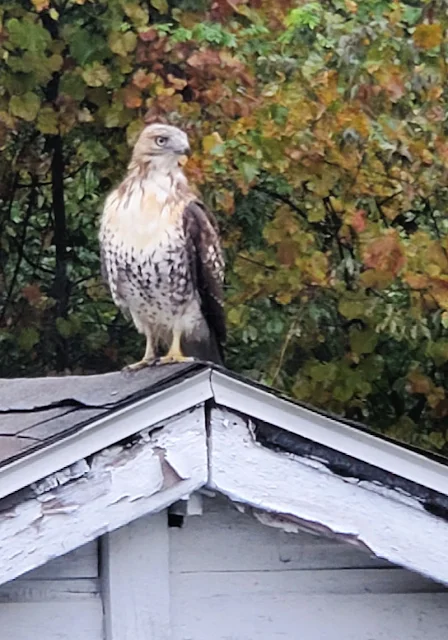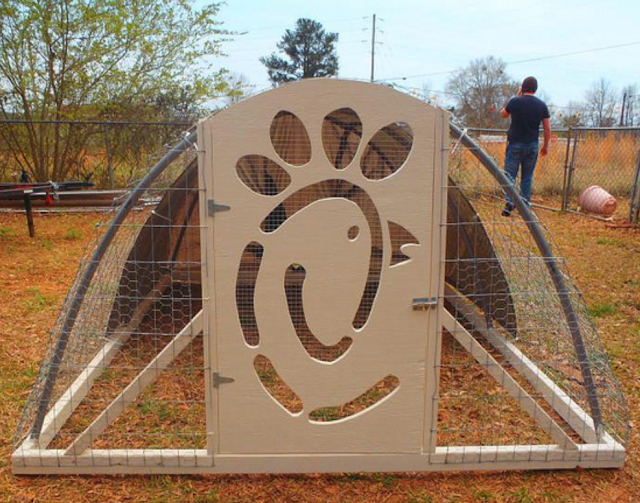How Can I Protect my Chickens from Hawks?
Of all the various predators that will go after your chickens, the aerial type are often the most challenging.
Short of a completely enclosed pen or run, the truth is that your chickens (and ducks) are vulnerable to predator attacks if they free range. And raptors are just one predator to watch out for.
A smallish hawk like a coopers or red tail likely won't be able to carry off a grown chicken or duck, but they can still injure them by swooping down and smashing down onto them, possibly even breaking their legs upon impact and then proceeding to eat them live right on the ground (gross, I know, but true).
And the larger raptors, like what I believe is a Northern Harrier? maybe? pictured above, can absolutely carry off a standard chicken or duck.
At the very least their talons can inflict some serious damage.
Younger chicks and pullets are obviously at more risk due to their size and relative lack of experience hiding from predators. Bantam breeds are also more vulnerable to aerial predators.
And hawks aren't the only threat. Last summer, we watched as a raven grabbed a wild turkey pullet and flew away with it.
Heartbreaking to watch as the mother turkey basically lost her mind and the baby peeped frantically as they raven flew over the tree line. But unfortunately there was nothing we could do.
Under the federal Migratory Bird Treaty Act of 1918, it is a federal crime to "pursue, hunt, take, capture, kill, attempt to take, capture or kill, possess, or [use for commercial purposes]" any migratory bird in the United States with authorization from the U.S. Fish and Wildlife Service even to defend your chickens or other livestock. That means that it's illegal to shoot eagles, hawks, owls or any other raptor even in defense of your flock.
But using these few simple tips can help to keep your chickens safe from hawks, eagles and other raptors.
How Can I Protect my Chickens from Hawks?
Covered Pen
The simplest way to keep your chickens safe from hawks is to keep them in a covered run.
Welded wire is the safest bet because it will also keep out other ground predators that might scale the sides of your run like raccoon or fox, but a simple plastic bird or deer netting (or even a tarp) will keep the flying predators out.
While I never recommend chicken wire for the sides of the run because its too easy for a dog or fox to just rip right through it, it will be effective over the top against raptors.
Even simpler? Run fishing line across the top of your run in a diamond pattern with the space between the lines no more than four feet or so.
A hawk generally won't fly through a space that small, but it's not 100% foolproof and desperate hawks have been known to breach fishing line.
(Note: We used fishing line over our run in Virginia for several years and never had any problems with hawks.)
If you want to let your chickens out into your yard and the area is too large to completely cover, running the fishing line say from tree to tree across the expanse of your yard 7+ feet up in the air is quick, easy and inexpensive - and better than nothing.
Use a Chicken Tractor
A chicken tractor is an option if you have a small flock. It's basically a portable coop/run combo that can be moved around an area so the chickens are always on fresh, new grass. You can find the plans for this cute option HERE.
Build a Chunnel
A chicken "chunnel" is another option. Constructed from chicken wire and pvc piping or boards, a chunnel provides a safe tunnel system around your yard that allows the chickens to roam the length of the tunnel, safe from predators.
Chip Gaines of Fixer Upper fame built a great chunnel for Joanna around the perimeter of her garden to try and keep the grasshoppers out of the garden.
The beauty of using a chunnel that encircles your yard or garden is that the chickens will munch on any bugs that try and breach the perimeter!

photo credit: HGTV/Fixer Upper
A Flash of Light
A sudden flash of light will startle a hawk and foil it's attempts to terrorize your flock.
Using aluminum pie plates, strips of aluminum foil or old CD's or DVD's (my favorite way to repurpose all those old movies you never watch!) around the yard hanging from tree branches, your deck railing or along a fence using some of that fishing line can help to deter hawks.
The erratic movement of the object along with a brilliant ray of color each time the sunlight hits the shiny side will scare off the flying menaces.
Employ a Guard Animal
A dog, donkey, alpaca or other guard animal that mingles with your flock can help to protect them from hawks.
I've read that merely keeping your chickens in an area with goats or horses can deter hawks because they see the larger forms down below and will move on.
In all the years we lived in Virginia and our chickens roamed in our horse pasture, we never did have a single hawk attack, come to think of it.
Add a Rooster
Keeping a rooster in your flock is a good idea if you free range because he will keep an eye to the sky and sound an alarm if he spots a threat, allowing the hens to race to safety.
I've also noticed that our ducks are also way more vigilant about watching the skies and will freeze with their head cocked to one side when they spot a hawk.
So by watching the ducks, I've learned to spot hawks well in advance of their arrival.
A "ScareHawk"?
A scarecrow strategically placed in the area where your chickens free range can help to scare off hawks. Move it around periodically to throw the hawks that fly overhead off balance.
The step-by-step tutorial to make your own "scarehawk" is included in my new book 101 Chicken Keeping Hacks. Order your copy here.
Don't Scare Away the Crows!
Surprisingly, crows and ravens are a good hawk deterrent. They will chase hawks away from their nests....so I'm always happy to see the crows hanging around.
As an aside, they don't actually seem concerned by our scarehawk - which is a good thing.
Fact or fiction? I have also had many people tell me that hawks won't attack black chickens because they think they're crows or ravens, so if you have a problem with hawks, maybe think about adding some black chickens to your flock. Breeds like Australorps, black Ameraucana or black French Marans are all good choices.
Guard Owl
Hawks are notoriously afraid of owls. A few plastic owl decoys positioned around your yard can keep the area hawk-free. (or in our case, this weird furry owl that was a Christmas gift last year!)
As with the scarecrow, be sure to move the fake owl around from time to time.
The Human Factor
Do as I do and only free range when you can supervise. A hawk is going to think twice about coming too close when there's a crazy lady running and screaming and throwing rocks at it!
One thing to keep in mind is that not all raptors will circle, giving everyone ample time to get to safety. For instance, red tail hawks will sit up in a tree or on a fence post...just waiting.
Pay Attention to the Time of Day and Year
There are times of year that seem to be worse as far as hawk presence goes. In the spring and fall when they are migrating, we seem to see more hawks.
In the spring they also have babies to feed, and once those babies grow up, they teach them to hunt.
I've also noticed that young hawks will tend to be a bit more bold than the older ones, taking more chances and venturing closer to my flock. So early spring is a bad time for the chickens trying to free range!
The time of day also matters. The hawks start looking for food each morning and then once they have eaten their fill, they seem to be done for the day.
We rarely see hawks around after noon time. I generally don't free range my chickens and ducks until 2pm or later for this reason. We see far more hawk activity early in the day.
Switch up your Schedule
All kinds of predators learn routines. For this reason, you should switch up your schedule. Let your chickens free range for a few days, and then keep them in for a day.
Let them out at different times of day. Move things around in the yard, in addition to a scarecrow or owl decoy.
Lawn chairs, ladders, wheelbarrows, vehicles and that sort of thing can be moved around to keep the hawks on their toes.
Provide Cover
And lastly, lawn chairs, ladders, wheelbarrows and vehicles will all provide shelter for your chickens to duck under if they spot a hawk.
In addition to bushes and shrubs, under the deck and even under the coop, be sure there are plenty of places for your flock to hide if a raptor flies overhead.
I hope some of these tips were helpful.
I should reiterate that aerial raptors are federally protected and it's against the law to shoot them.
No. Matter. What.
No exceptions.






































